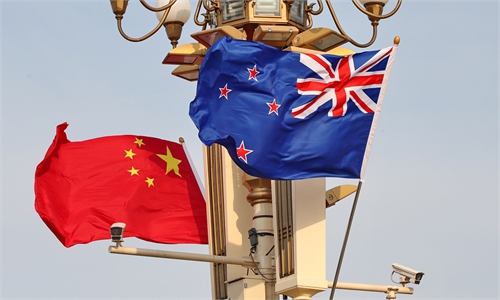New Zealand Prime Minister Chris Hipkins’ final remarks on Taiwan and China’s South China Sea are cliches echoing US strategy toward China, but the essence of his speech is to underscore the importance of stabilizing relations with China, which has been deliberately downplayed by some Western media, Chinese analysts said, after some reported Hipkins’ “concerns” about China’s growing influence as a driver of the “increasing competition in the Indo-Pacific”.
In a speech at the China Business Summit on Monday, Hipkins laid out New Zealand’s ties to China. He noted that “it is normal for states to pursue their interests and use all the tools at their disposal to exert regional and international influence…but the rise of China and the way it seeks to exert that influence is also a major driver of growing strategic competition, particularly in our wider home region, the Indo-Pacific,” according to a transcript released by the New Zealand government.
China is a member of Asia-Pacific and has always worked with countries in the region to practice genuine multilateralism and uphold regional peace and stability. Based on mutual respect, China will engage with all parties, including New Zealand, to jointly contribute to regional prosperity and stability, Foreign Ministers’ Spokesman Mao Ning said Monday at the meeting. a routine press conference.
Mao also noted that the Taiwan issue is China’s internal affair and the most important guarantee for cross-strait stability is upholding the one-China principle. In addition, there are no problems on the South China Sea, and it is hoped that relevant countries will respect the efforts of regional countries to defend the stability of the South China Sea.
Hipkins’ speech, which outlined the New Zealand leader’s China policy after his first visit to China in June, which has helped expand cooperation in the economy, trade, education, technology, tourism and other fields, has been ignored by some Western media. The Guardian on Monday highlighted Hipkins’ remarks on China’s growing influence as “a major driver of growing strategic competition”, particularly in the Indo-Pacific.
Hipkins’ remarks on the Taiwan issue and the South China Sea were repeated cliches echoing US strategy toward China. However, compared to the rhetoric used by other Western allies of the United States, the New Zealand leader’s remarks were “much more toned down” and the essence of Hipkins’ speech is to stabilize China-New Zealand relations. , Chen Hong, director of the Center for New Zealand Studies at East China Normal University, told China Direct on Monday.
During Monday’s speech, Hipkins took more time to talk about economic and people-to-people ties between China and New Zealand, and the importance of continuing to engage with China, which has been deliberately understated by these Western media, analysts said.
Chen said Hipkins’ Monday speech was more like a comprehensive outline of his China policy after he was sworn in as New Zealand’s prime minister in January, and it shows New Zealand has stopped placing the United States United at the center of its foreign policy, a position that has also been adopted by Australia, making China a center of its diplomacy.
The speech, as well as Hipkins’ visit to China in June, also showed that he has a strong focus on stabilizing and improving relations with China, as it meets New Zealand’s national interests. and help him lead the Labor Party to win the next general election. elections, Chen said.
While New Zealand enjoys stable relations with China, analysts have also warned that it should also remain vigilant against some hawkish politicians pushing for a tougher stance from China as well as pressure from Australia. and the United States to sow discord and disrupt bilateral relations.’
This article is originally published on chinedirect.net







